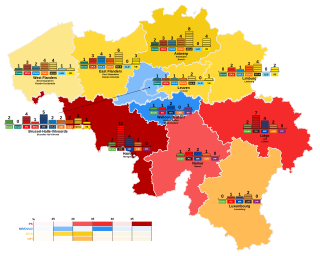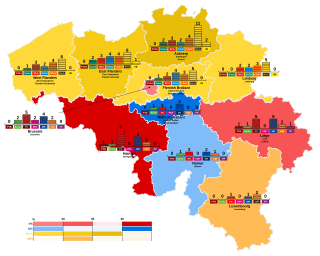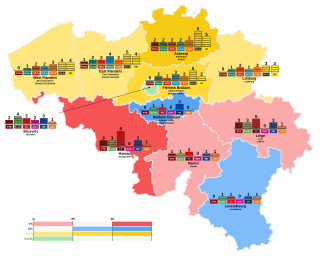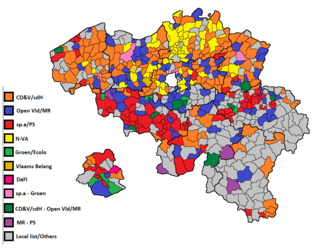
The politics of Belgium take place in the framework of a federal, representative democratic, constitutional monarchy. The King of the Belgians is the head of state, and the prime minister of Belgium is the head of government, in a multi-party system. Executive power is exercised by the government. Federal legislative power is vested in both the government and the two chambers of parliament, the Senate and the Chamber of Representatives. The federation is made up of (language-based) communities and (territorial) regions. Philippe is the seventh and current King of the Belgians, having ascended the throne on 21 July 2013.

Flemish Brabant is a province of Flanders, one of the three regions of Belgium. It borders on the Belgian provinces of Antwerp, Limburg, Liège, Walloon Brabant, Hainaut and East Flanders. Flemish Brabant also surrounds the Brussels-Capital Region. Its capital is Leuven. It has an area of 2,118 km2 (818 sq mi) which is divided into two administrative districts containing 65 municipalities. As of January 2019, Flemish Brabant had a population of 1,146,175.

Groen, founded as Agalev, is a green Flemish political party in Belgium. Its French-speaking equivalent is Ecolo; the two parties maintain close relations with each other.

The Parliament of Wallonia is the legislative body of Wallonia, one of the three self-governing regions of Belgium. The parliament building, the former Hospice Saint-Gilles, is situated in Namur, the capital of Wallonia, at the symbolic confluence of the Meuse and the Sambre, the two main rivers of the most inhabited parts of Wallonia, the Sillon industriel. On the other side of the Meuse, facing the Parliament, is the Élysette, the seat of the Government of Wallonia.

Flemish political parties operate in the whole Flemish Community, which covers the unilingual Flemish Region and the bilingual Brussels-Capital Region. In the latter, they compete with French-speaking parties that all also operate in Wallonia. There are very few parties that operate on a national level in Belgium. Flanders generally tends to vote for right-wing, conservative parties, whereas in French-speaking Belgium the socialist party is usually the most successful one.

The Federal Government of Belgium exercises executive power in the Kingdom of Belgium. It consists of ministers and secretary of state drawn from the political parties which form the governing coalition. The federal government is led by the prime minister of Belgium, and ministers lead ministries of the government. Ministers together form the Council of Ministers, which is the supreme executive organ of the government.

The Belgian provincial, municipal and district elections of 2006 took place on Sunday 8 October 2006. The electors have elected the municipal councillors of 589 cities and towns as well as the ten provincial councils. The voters in the town of Antwerp have also been able to vote for the city's district councils. In seven Flemish municipalities with a special language statute and in the Walloon municipality of Comines-Warneton the aldermen and the members of the OCMW/CPAS council have also been directly elected.

Federal elections were held in Belgium on 10 June 2007. Voters went to the polls in order to elect new members for the Chamber of Representatives and Senate.

Federal elections were held in Belgium on 13 June 2010, during the midst of the 2007-11 Belgian political crisis. After the fall of the previous Leterme II Government over the withdrawal of Open Flemish Liberals and Democrats from the government the King dissolved the legislature and called new elections. The New Flemish Alliance, led by Bart De Wever, emerged as the plurality party with 27 seats, just one more than the francophone Socialist Party, led by Elio Di Rupo, which was the largest party in the Wallonia region and Brussels. It took a world record 541 days until a government was formed, resulting in a government led by Di Rupo.

The Belgian provincial, municipal and district elections of 2012 took place on 14 October. As with the previous 2006 elections, these are no longer organised by the Belgian federal state but instead by the respective regions:
The sixth state reform in the federal kingdom of Belgium is the result after the 2010–2011 Belgian government formation, with 541 days of negotiations, the longest ever in Belgium and possibly the world. The agreement was made among the Christian-democratic CD&V and cdH, social-democratic sp.a and PS, liberal Open Vld and MR and ecologist Groen! and Ecolo, each respectively a Flemish and French-speaking party. The first six parties, therefore not including the green parties, then formed the Di Rupo I Government. The Flemish nationalist party New Flemish Alliance, which became the largest after the 2010 elections, is notably not part of the agreement nor of the government coalition.

Federal elections were held in Belgium on 25 May 2014. All 150 members of the Chamber of Representatives were elected, whereas the Senate was no longer directly elected following the 2011–2012 state reform. These were the first elections held under King Philippe's reign.
Regional elections were held in Belgium on 25 May 2014 to choose representatives for the Flemish Parliament, Walloon Parliament, Brussels Parliament and the Parliament of the German-speaking Community. These elections were held on the same day as the 2014 European elections as well as the 2014 Belgian federal election.

Federal elections were held in Belgium on 26 May 2019, alongside the country's European and regional elections. All 150 members of the Chamber of Representatives were elected from eleven multi-member constituencies.

The Belgian provincial, municipal and district elections of 2018 took place on Sunday 14 October 2018. They are organised by the respective regions:

The 2019 Belgian regional elections took place on Sunday 26 May, the same day as the 2019 European Parliament election as well as the Belgian federal election.
In the run up to the 2024 Belgian federal election, various organisations carry out opinion polling to gauge voting intention in Belgium. The date range for these polls are from the 2019 Belgian federal election, held on 25 May, to the present day. The results of nationwide polls are usually numerically split into the three Belgian regions: Flanders, Brussels and Wallonia. Federal seat projections for the Chamber of Representatives are presented together under these regional polls. The federal election will be part of a group of elections which also include the regional elections and the European elections. Some polls might be undefined voting intentions without differentiating between the elections.
The 2024 Belgian regional elections will take place on Sunday 9 June, the same day as the 2024 European Parliament election as well as the Belgian federal election.


















